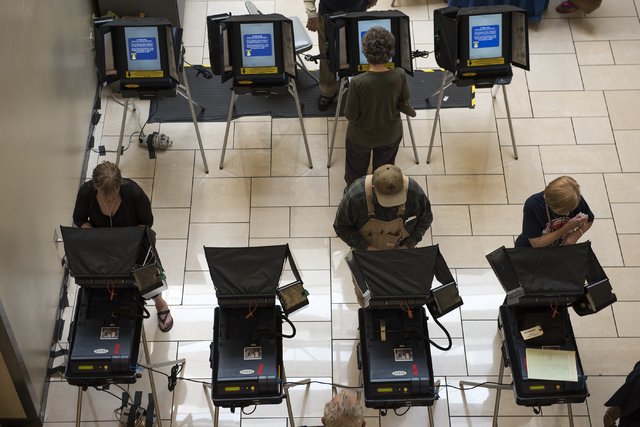Nevada Republicans: Dump caucus, use early primary for presidential race

CARSON CITY — Supporters of a Republican-backed bill to scrap Nevada’s presidential caucuses for a secret-ballot primary in February argued Tuesday that the move would expand participation in choosing the nation’s president.
“Some people are very worried about upsetting the holidays and the inconvenience,” state Sen. James Settelmeyer, R-Minden, told members of the Assembly Committee on Legislative Operations and Elections, which took no action on Senate Bill 421.
“I personally don’t believe that the inconvenience of selecting the leader of the free world through a process that allows you to walk into a ballot box and cast your vote is too much of an inconvenience,” he said.
Settelmeyer added that caucuses, held on a single day for only a few hours, disenfranchises the elderly, military personnel and others who can’t get to their caucus location at a specific time.
But Democrats, county election officials and others said the change would be difficult to implement and upset the entire state election cycle. The bill would allow the Democratic Party to opt out of the presidential primary and continue a caucus.
The bill would set the presidential preference primary for the last Tuesday in February and move all other state primary races to February from June. It passed the Senate last week on a partisan 11-9 vote.
Republican supporters argue the change would protect the Silver State’s early influence in the presidential selection process and encourage more voter participation. It would also dilute the influence of grass-roots party activists who are more motivated to turn out for precinct caucuses and in recent years have taken control of the state GOP Party.
This election cycle, several Republican presidential candidates are threatening to snub Nevada’s first-in-the-West caucus because the state GOP is run by Rand Paul loyalists, giving the U.S. senator from Kentucky a perceived advantage. Should other Republican hopefuls skip Nevada, the state would lose its relevance in shaping the national presidential debate.
Assemblyman Glenn Trowbridge, R-Las Vegas, said he appreciated the idea but worried about campaigning over the holidays. Under the bill, candidates would file for office in early November, meaning the campaign season would be in full swing over Thanksgiving, Christmas and New Year’s.
He said having just a presidential primary and leaving the election calendar for the state’s other races alone would alleviate that concern. But Settelmeyer said that would carry a price of several million dollars.
Assemblyman Elliot Anderson, D-Las Vegas, also worried about holiday campaigns.
“My concern, we’re really going to make a lot of people mad,” he said.
Nick Phillips, political director of the Clark County Republican Party, testified as an individual and suggested candidates would need to exercise “tact” on the campaign trail.
Candidates shouldn’t be knocking on doors and “asking for some turkey on Thanksgiving” while soliciting votes, he said.
Joe Gloria, Clark County voter registrar, and other county election officials said moving the primary up four months would make it difficult to train election workers. Training is done a few months in advance, and they fear many people won’t be willing or available over the holiday season.
“I’ve thought long and hard about this,” said the committee chairman, Assemblyman Lynn Stewart, R-Henderson. “I know of the expense. I know of the campaigning.
“I’m familiar with all of the arguments. I will pledge to you I will deal with this carefully,” he said.












